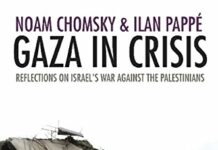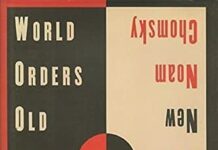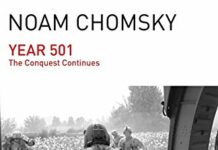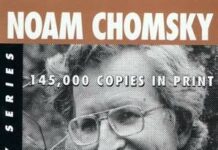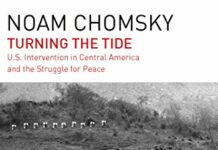
Ebook Info
- Published: 1999
- Number of pages: 208 pages
- Format: PDF
- File Size: 3.11 MB
- Authors: Noam Chomsky
Description
Analyzing the Nato bombing campaign over Kosovo, Noam Chomsky poses questions about the New Humanism: Is it guided by power interests or by humanitarian concern? Is the resort to force undertaken in the name of principles and values, as professed? Or are we witnessing something more crass and familiar?.
User’s Reviews
Editorial Reviews: About the Author Noam Chomsky is a world renowned linguist and one of America’s foremost social critics. He is Institute Professor in the Department of Linguistics and Philosophy at MIT and the author of numerous books for Pluto Press.
Reviews from Amazon users which were colected at the time this book was published on the website:
⭐Great Price! Excellent Shipping Tim! Thank You!
⭐Unusually for Chomsky “Lessons from Kosovo” is tightly focussed on one particular conflict: the much lauded NATO intervention in Kosovo in spring 1999 that was carried out under the banner of being an almost historically unique “Humanitarian Intervention”. In this short book Chomsky destroys the NATO case on every major point, and tears apart the rhetoric and rationale of Clinton, Blair, et al and their many media cheerleaders into shreds.Rather than being an intervention to prevent ethnic cleansing it inaugurated it, as a simple look at the chronology would reveal as well as paying attention to what military figures such as US-NATO commanding General Wesley Clark said, and the pre-war diplomacy which culminated in the Rambouillet Agreement was almost certainly set up to be refused by the Serbs, indeed it was more than NATO achieved after three months of bombing as well as flouting the agreements that brought the bombing to an end.Chomsky takes the reader on a brief tour through the rhetoric used during conflicts through the ages and finds that practically every resort to arms is carried out under the banner of lofty words about “principles and values” and proclamations regarding it’s “humanitarian” nature. With regard to other conflicts occurring during the 1990’s that were minimally as serious as that in Kosovo, Chomsky makes the point that a NATO member, Turkey, was carrying out far worse massacres, with generous access to US weaponry, with hardly peep from NATO, Clinton, Blair and their media fanclub. Likewise Colombia, not to mention the murderous sanctions being inflicted on Iraq primarily by the US & the UK that resulted in hundreds of thousands of deaths.In short this is a book that is still well worth reading, a tightly focussed and devastating critique of the NATO intervention and its immediate aftermath. The reader who is interested in the conflicts that tore Yugoslavia apart during the 1990’s would be well advised to look at Susan Woodward’s
⭐which is exhaustive on the causes of the conflict as well as its early years. With regard to some of the aforementioned media cheerleaders Verso’s fine Counterblast series includes looks at
⭐,
⭐and
⭐.
⭐Chomsky’s latest is a meticulous dissection of the role played by the Western, primarily American, media during the 1999 Kosovo crisis. Although a bit tedious at times if one has already read his classic critical works on the mass media as propaganda system (e.g. “Manufacturing Consent” and “Necessary Illusions”), “New Military Humanism” is still a crucial work to read if one wants to understand an important aspect of this war. Perhaps my only criticism of the book is that Chomsky is not sufficiently familiar with recent Balkan politics, so that his overriding message at times seems to be that Kosovo did not become a problem until the U.S. government, followed by the American media, came in and made it a problem. Kosovo and its Albanian population were in fact one of the major contributing factors to the breakdown of Yugoslav politics in the late 1980s, eventually leading to the collapse of that country with the consequences that are well known to us all. The problems in Kosovo itself festered for over ten years before taking the form of open hostilities in 1997/1998. Where Chomsky is correct is in pointing out that once the U.S. and (to a lesser extent) its NATO allies decided to take a more active role in Kosovo for whatever reason, the media promptly jumped in to generate public support for any policy moves. What the media did, following cues from the State Department, NATO headquarters and elsewhere, was to turn something that was essentially a regional dilemma (albeit an extremely troubling one) into a matter of major international concern. After all, why should Kosovo be more important to the average American citizen than East Timor-as Chomsky frequently points out? The stage was then set to make even air strikes against Serbia publicly acceptable-much as the war against Iraq was in 1991. Parenthetically, I don’t say any of this, and I don’t necessarily think it was Chomsky’s intent, so much to condemn or defend the local actors in this conflict, i.e. the KLA and Milosevic’s regime of thugs and war criminals, but to criticize the way the problem was handled by the “world’s only remaining super-power” once it become involved. Just as in Bosnia, the timing of involvement and the political structure set up to maintain “the peace” are all wrong, as the continuing turmoil of Kosovo under international military occupation is now proving.
⭐I found this book an excellent if chilling read. It is informative, based on facts and easy to follow. Gripping, could not drop the book. Gives a different perspective on various world events and provides counter balance for the accepted media view of the world today. Highly recommended to anyone with an open mind, free thinking and challenging the accepted view presented to us by the establishmen.
⭐Unusually for Chomsky “Lessons from Kosovo” is tightly focussed on one particular conflict: the much lauded NATO intervention in Kosovo in spring 1999 that was carried out under the banner of being an almost historically unique “Humanitarian Intervention”. In this short book Chomsky destroys the NATO case on every major point, and tears apart the rhetoric and rationale of Clinton, Blair, et al and their many media cheerleaders into shreds.Rather than being an intervention to prevent ethnic cleansing it inaugurated it, as a simple look at the chronology would reveal as well as paying attention to what military figures such as US-NATO commanding General Wesley Clark said, and the pre-war diplomacy which culminated in the Rambouillet Agreement was almost certainly set up to be refused by the Serbs, indeed it was more than NATO achieved after three months of bombing as well as flouting the agreements that brought the bombing to an end.Chomsky takes the reader on a brief tour through the rhetoric used during conflicts through the ages and finds that practically every resort to arms is carried out under the banner of lofty words about “principles and values” and proclamations regarding it’s “humanitarian” nature. With regard to other conflicts occurring during the 1990’s that were minimally as serious as that in Kosovo, Chomsky makes the point that a NATO member, Turkey, was carrying out far worse massacres, with generous access to US weaponry, with hardly peep from NATO, Clinton, Blair and their media fanclub. Likewise Colombia, not to mention the murderous sanctions being inflicted on Iraq primarily by the US & the UK that resulted in hundreds of thousands of deaths.In short this is a book that is still well worth reading, a tightly focussed and devastating critique of the NATO intervention and its immediate aftermath. The reader who is interested in the conflicts that tore Yugoslavia apart during the 1990’s would be well advised to look at Susan Woodward’s
⭐Balkan Tragedy: Chaos and Dissolution After the Cold War
⭐which is exhaustive on the causes of the conflict as well as its early years. With regard to some of the aforementioned media cheerleaders Verso’s fine Counterblast series includes looks at
⭐Michael Ignatieff
⭐,
⭐Thomas Friedman
⭐and
⭐Bernard Henri Levy
⭐.
⭐In “A New Military Humanism” Chomsky illustrates “a systematic campaign of terror, including murders, rapes, arsons … severe maltreatments”, as well as widespread destruction of populace, crimes against humanity, conducted by Serbian troops in Kosovo. Chomsky exposes a campaign of literal ethnic cleansing, under the aggression of Milosovek and records US/NATO culpability through involvement. Chomskys hypothesis, though simplified for the purposes of this review, provide vivid detail that an “accusation rarely noted in the American press, but extensively accepted as truth abroad, was that the bombing of Yugoslavia was a flagrant violation of international law,” and had terrible human cost. Chomsky brings in a wide periphery of details, serving to expose Orwellian sentiment in the aligned world. “It wouldn’t do to mention that fact” is the modus operandi which thoroughly plagues journalism and intellectual culture. To support the exposure of vast hypocrisy, morally bankrupt US/UK/NATO hegemony, Chomsky focuses primarily on Turkish/Iraqi massacres of Kurdish populations receiving direct US support, and compares/contrasts these to Serbian massacres in Kosovo.I understand, as I have read the other reviews which criticize this book, why some would not accept this work. From what I noticed, criticism from other reviews amounts to the accusations that Chomsky does not understand the Balkans, that he misrepresents the conflict, or that he overlooks the facts etc; but I just don’t see it. This book is not intended as a thorough encompassing history of Yugoslavia, Kosovo, Serbia or the Balkan region in general (it is 156 pages long). It is entitled “A New Military Humanism” for a reason; it serves its purpose. Chomsky has intended in “A New Military Humanism” to voice dissent to NATO culpability in escalating atrocity perpetrated by Serbians under Milosevic in Kosovo. Chomskys central thesis is that once Human Rights Observers were withdrawn from Kosovo (preceding NATO bombing), atrocities escalated dramatically. Secondly, he indicates that NATO commanders acknowledged Milosevic’s escalation as a probable outcome prior to NATO bombing. As other reviewers rightly suggest, if you want historical literature, there are much better places to look (Roy Gutman, David Rohde and Noel Malcolm are some titles suggested by others).In “A New Military Humanism” Chomsky gives an 156 page account of why US/NATO hegemony is not in a position to speak of ‘humanitarian intervention’ or even, that it does not exist at all, except in function of ‘newspeak’ itself.
⭐Honest and brave thoughts and facts – how military eager to defend anything that promise good profit, not minding killing this “anything” in the process
Keywords
Free Download The New Military Humanism: Lessons From Kosovo in PDF format
The New Military Humanism: Lessons From Kosovo PDF Free Download
Download The New Military Humanism: Lessons From Kosovo 1999 PDF Free
The New Military Humanism: Lessons From Kosovo 1999 PDF Free Download
Download The New Military Humanism: Lessons From Kosovo PDF
Free Download Ebook The New Military Humanism: Lessons From Kosovo

